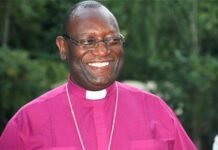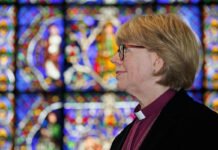The Primate of the Church of Nigeria has called upon the government to prepare a fresh constitution of the West African republic rather than amend the constitution imposed by the military in 1999.
Speaking on 23 February 2022 at the start of the Church of Nigeria’s standing committee and House of Bishops’ meeting, the Most Rev. Henry Ndukuba said: “While we commend the National Assembly for their efforts to review the present constitution, we are convinced that what we need is a totally civilian constitution made by a sovereign representation of the ethnic nationalities of this country.”
Nigeria’s constitutional history has seen colonial, tribal, unitariary, regional, military and civilian regimes.The Act of 1862, followed by the Southern Nigeria Act of 1906 and the Amalgamation Act of 1914 under the supervision of the British provided the initial legal framework for the government of the colony.
Local dissatisfaction prompted the passage of the Clifford Constitution of 1922 which created a Legislative Council of 46 members elected from across the colony. Following the Second World War agitation for greater self-control by Nigerians led first to the Richards Constitution, named after Governor Sir Arthur Richards, but it was not rejected as the colonial administration did not consult with Nigerians in its drafting.
A new constitution named after Governor Sir John Macpherson was adopted in 1951 after a series of nationwide consultations. However, the Macpherson constitution ran into objections due to political rivalries between the country’s regions. This led to the Lyttleton Constitution of 1954 which made Nigeria a federation of three regions: Northern, Western and Eastern regions, removing the unitary government established in 1951.
In preparation for independence, the London Constitutional conferences of 1957 and 1958 were held, leading to the 1960 Independence Constitution. In 1963, the Republican Constitution was made followed by the 1979 Constitution prepared by an appointed committee. This gave way to the 1989 Constitution adopted by the Constituent Assembly, with one third of its members appointed by the army. Work began on a 1994 constitution during the rule of General sani Abacha, but this was abandoned after political leaders from the south-west refused to participate after the general annulled the results of the 12 June 1993 election. In 1999 a constitution was promulgated into law by the military regime of General Abdulsalami Abubakar after the Constitution Debate Co-ordinating Committee led by Justice Niki Tobi held two months of national consultations.
The Nigerian parliament has taken up the task of amending the 1999 military backed constitution. Archbishop Ndukuba urged the assembly to prepare a new constitution rather than amend the old, and to ensure that the new document is prepared by representatives of all Nigeria’s ethnic nationalities.
“This will address the fundamental issue of unity and a prosperous nation,” he told church leaders in Port Harcourt. “We need a new citizen-made national constitution and not the amendment of a military-formulated constitution.”



